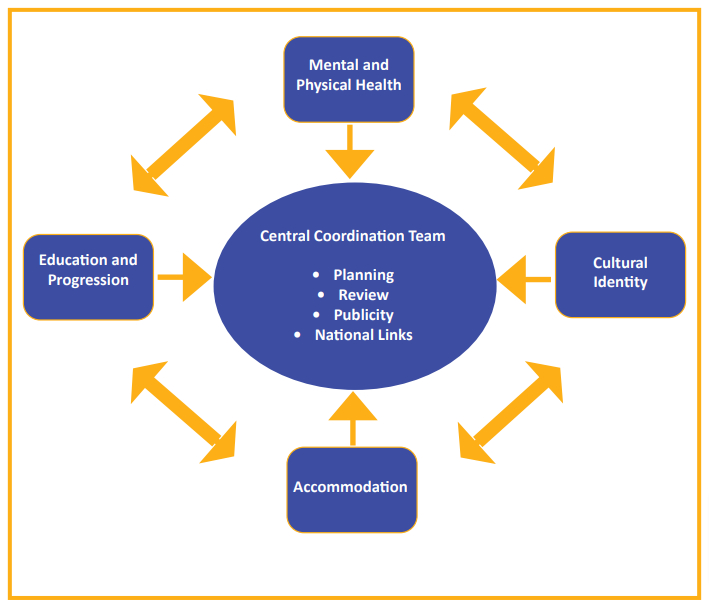Management and Monitoring
Clare Traveller CDC
Management and Monitoring
The project will work to establish four action groups – with the participation mainly of Travellers who have particular interest or experience in the particular programme area.
It is important that each action group (and efforts to involve Travellers) takes into account the different needs and circumstances of different sections of the Traveller community (men, women, young Travellers, and Travellers who are more marginalised and excluded – for example, Travellers with a disability, members of the LGBTQ+ community, Travellers in prison, Travellers living in more isolated rural areas). Each of our programmes, and all of our actions, will be inclusive and encourage the active participation of all Travellers – avoiding exclusive focus on particular areas or particular families.
A central coordination team (made up of staff and volunteers) will also draw on membership of action groups.
Four Action Groups
While the action groups will be made up, in the main, of members of the Traveller community, representatives of other organisations and service providers will be invited to join in the planning and implementation of specific actions as they arise. Membership of action groups will therefore not be fixed to the same people over the period of the plan. It will rather be open and flexible – with the capacity to invite new people to join as new actions are taken on. This applies to representatives of local service providers as much as to members of the Traveller community – with people participating on the basis of their interest and expertise, depending on the activity. For example:
Where the Health Action Group is addressing challenges to do with suicide, it will be open to invite members of mainstream mental health services, as well as those active in voluntary suicide prevention organisations, to join the action group for the planning and implementation of that particular action. Equally, it is important that those members of the Traveller community with direct experience of suicide in their family (or living with the fear of suicide) are encouraged to take an active role in the action group around this subject.
The Accommodation Action Group should be open enough to encourage participation of those Travellers facing the greatest challenges in relation to their accommodation needs. In addressing the serious and growing concern with homelessness, for example, it is important that those with first-hand experience of homelessness can lead the discussion. But it is also important that those with expertise in the delivery of accommodation are also encouraged to participate (from, for example, local authority housing section, Approved Housing Bodies or homeless organisations).
When the Cultural Identity Action Group addresses the issue of ongoing discrimination, the same principle applies. One aspect of this, for example, is the experience of young Travellers in their engagement with law enforcement. Where monitoring of incidences of harassment or discrimination is taking place, it is important that the voices and experiences of local young Travellers are taken on board in the working group. It will be also important that members of the Gardaí are afforded the opportunity to participate – increasing awareness of the problems involved and creating a platform for improvements to come about in equality and human rights terms.
When the Education and Progression Action Group looks at possible opportunities to create social enterprise, it will be extremely important to involve Traveller men (especially in those areas in which men have an interest, such as horses). When this group addresses support for young Travellers in education, the parents of children in school will be central to planning and carrying through on actions. In all of these cases, the relevant service providers and support agencies will also be encouraged to participate (teachers, enterprise support agencies, training providers etc)

The plan will guide Clare Traveller CDP in working towards change and the improvement of living conditions and life opportunities for members of the Traveller community. In doing so we are committed as an organisation to:
Participation in Action Groups will therefore change and evolve as the plan progresses, and as different challenges are encountered. This will have the benefit, on the one hand, of people being engaged on the basis of what they are most interested in. It will also, on the other hand, guarantee that people are bringing their own expertise and experience to the task in hand.
A key element in our Action Group strategy is linked to our strong commitment to build and maintain strong Traveller leadership in the organisation as a whole. The period of this plan will therefore see a commitment to encourage and facilitate Travellers in specific Action Groups to become more centrally involved (in either the central coordination team or the project’s Board of Management).
Coordination will be the responsibility of a team (with one worker and/or volunteer from each of the four programme areas) facilitated by the project coordinator.
The coordination team will meet weekly, planning actions and reviewing outcomes, according to yearly operational plans agreed by the Board of Management. A key objective in organisational terms is to facilitate succession to Traveller leadership at project management level. The existing coordinator will work through programmes and actions in the plan, in close cooperation with a member of staff, with this succession objective in mind.
Strategic Plan 2023
Download our Strategic Plan for more information
CLARE TRAVELLER CDP VISION STATEMENT
“Our aim is to improve living conditions, opportunities and achievement of human rights for Travellers in Clare. This will be pursued through establishing and strengthening local alliances and, most importantly, through building effective Traveller leadership and a strong Traveller voice”

